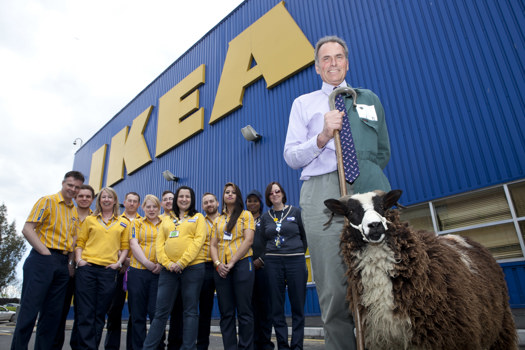They welcomed the news today that more British companies are committing to paying UK workers a living wage but have said they must 'stop trapping overseas workers in poverty.'
The call for a living wage comes from global poverty campaigner, War on Want and fashion campaigners, Labour behind the label and the National Garment Workers Federation.
War on Want has uncovered a systematic problem of worker exploitation, poverty pay and sweatshop conditions in a number of sectors supplying UK shops and supermarkets.
The charity has exposed workers in the tea industry in Kenya supplying British supermarkets, earning as little as 7p an hour. It has also highlighted similar poverty pay for workers on farms in South Africa supplying wine and fruit.
Labour behind the label's report Let's clean up fashion has exposed British firms which denied workers producing their clothes enough pay for decent food, housing, education for their children and healthcare.
The report named 29 brands involved, including Burberry, H&M, Zara, Paul Smith, Tesco, Sainsbury's, Monsoon and Marks and Spencer. Since the launch of the report in August 2011 nine of the 29 brands have not yet ensured workers in its supply chain receive a living wage.
Anna McMullen, campaign coordinator at Labour behind the label, said: "Multinational corporations, which exercise more power than many Governments and make increasingly large profits, have the responsibility to ensure human rights are upheld for people who produce and sell their goods.
"The right to decent wages is systematically abused both here and overseas. It is a scandal of our times."
Amirul Haque Amin, president of the National Garment Workers Federation in Bangladesh, said: "We are encouraged to hear that British firms have received accreditation for ensuring their staff earn a living wage. But UK fashion retailers increasingly demand lower prices from suppliers whose workers in my country make their clothes.
"It is high time these companies stopped trapping these workers in poverty."
In a speech today at Islington Council in London, Labour leader, Ed Miliband will unveil plans to deliver a 'living wage' of at least £7.20 per hour for millions of people in the UK, if Labour wins the next election.
At the start of living wage week, Miliband is expected to say in his speech: "There are almost five million people in Britain who aren't earning the living wage, people who got up early this morning, spent hours getting to work - who are putting in all the effort they can - but who often don't get paid enough to look after their families, to heat their homes, feed their kids, care for elderly relatives and plan for the future."
Miliband's brother David, the former foreign secretary, has given his backing to the campaign.
He wrote in The Observer: "Progress depends on keeping up the pressure and keeping up the campaigning. And it means finding incentives to persuade reluctant employers that it's in their interests as well."








